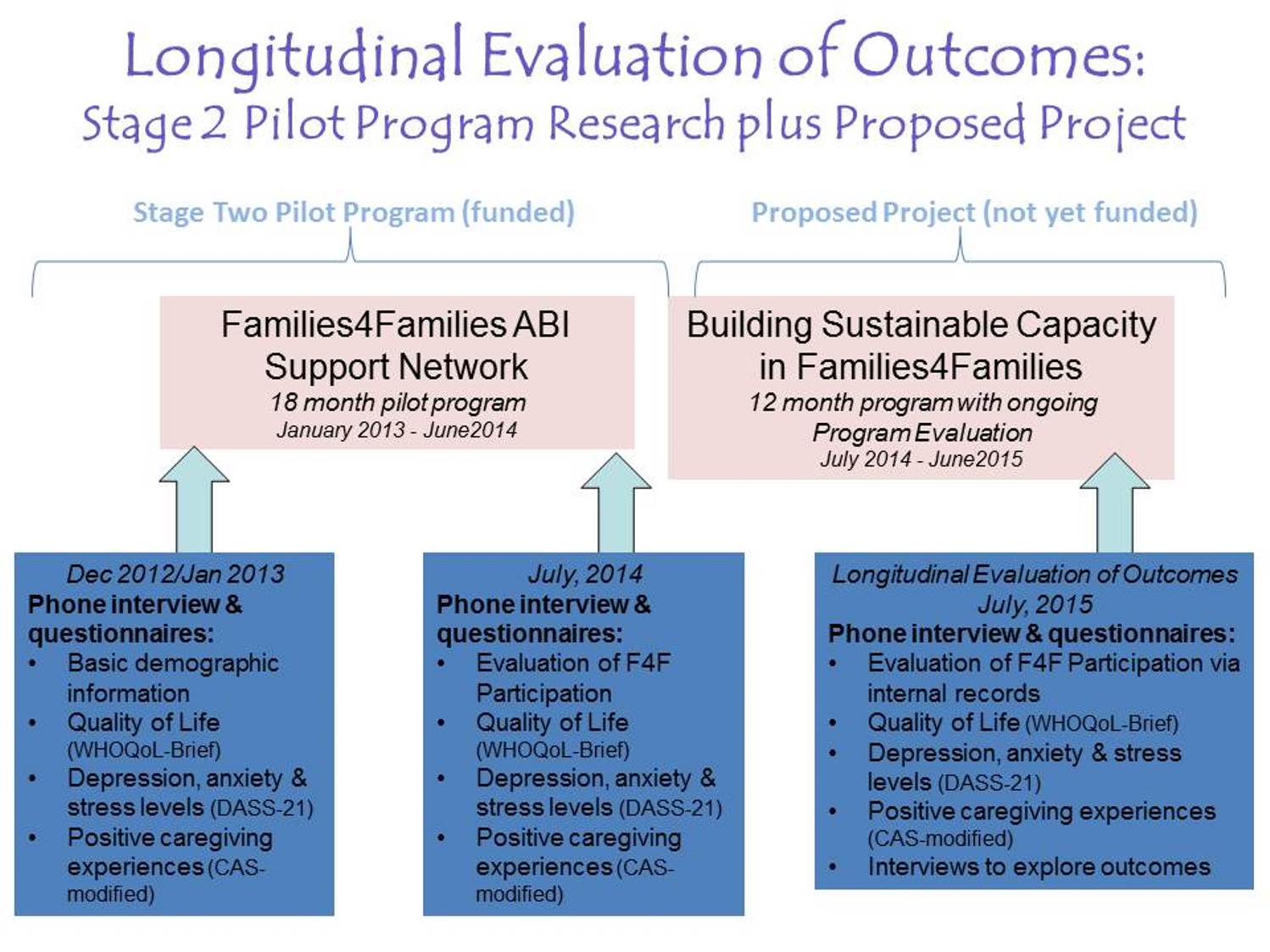Overall Research Plan
The Families4Families research team is currently applying for additional grants to further our research projects. This is diagrammatically presented below.
Research Project and Support Program Across SA July 2012-Sept 2014
This project aims to identify and address the quality of life, care giving experiences, mental health and support needs of families affected by acquired brain injury (ABI). Preliminary data from an initial survey and focus groups will be gathered and examined to facilitate development of a framework for the Families4Families ABI Support Network, an 18 month pilot program (Jan 2013-June 2014) which will deliver social, recreational, educational and community support for families with ABI. Outcomes of participation in Families4Familes will be determined through a series of interviews and questionnaires at commencement and at the end of the program, measuring quality of life, care giving experiences, mental health, support, and the development of sustainable informal community networks.
This project views the person with ABI and their family as a single unit, and by designing, establishing and evaluating a comprehensive ABI Family Support Network, will provide valuable social, educational, informational and peer support to people with ABI and their family caregivers. The project is centred around the needs of the person with ABI by supporting them directly and also indirectly by supporting their family members. There is a strong need for a family systems approach to family intervention after ABI, and this is the underlying principle of Families4Families. This project will provide families affected by ABI the opportunity to participate and share their experiences in a supportive and encouraging environment. Families will be provided with a chance to design, create and establish their own model of support and then to use this model to help other families experiencing a newly acquired brain injury. Families4Families will provide much needed opportunities to share experiences, access much needed social supports, exchange positive coping strategies, access respite and for entire families to develop sustainable social networks which last beyond the program.
The project consists of 2 research stages including the establishment and provision of an 18 month pilot program ‘Families4Families’. Chargeable costs of the project, including research and analysis, is $162,501.55 and this sum has been provided by a successful Julia Farr MS McLeod Benevolent Fund grant application. In addition, significant in kind and voluntary contributions totalling more then $115,700 are being provided by a range of organisations and individuals who are passionate about the urgent need for the ABI Family Support Network and research. The project is supported by Flinders University, its Community Re-Entry Program is the network’s auspicing agency.
The project has been developed by a passionate team of family members and professionals in the ABI community. Initially conceived by Dr Jennifer Farnden, who has developed the project utilizing her lived experience as carer to her brain injured husband along with prior academic and research skills, the project now includes experienced and motivated research and administrative teams. Dr Michelle Bellon, Ruth Crocker and Professor Richard Bruggemann have been instrumental in designing the research project underlying the project, while Jaime Gardner has played a key role in the grant application process and in gaining support for the project from key CRP and University stakeholders. A number of people living with ABI and their family members have also been involved in the project development and will be key in undertaking management of the Network supports – designing, delivering and managing their own network thus enabling the development of a new model of disability supports in this changing disability community sector.
Upon the conclusion of this research, findings will then be utilized in seeking long term funding for the ongoing support programs. Long term sustainability is yet to be resolved but opportunities exist within the NDIS plans based on the productivity commission report and, by being a separate entity by this stage, a range of other government and private funding organizations as well as being a key ABI educational provider within acute and rehab facilities for staff and family members which would also provide an income stream.


